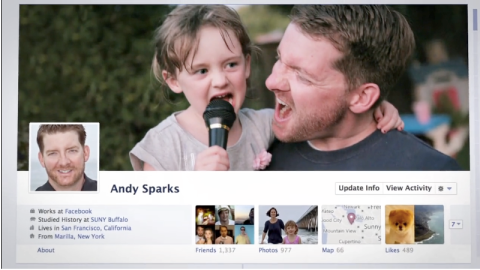The Existential Angst of the Facebook Timeline

Once Facebook flips the switch on the official public launch of its all-new Timeline feature, nearly any action that you take will become instantly sharable online to your friends as part of an ongoing digital narrative — whether it happened in the past, present or future. With nearly 800 million users worldwide, Facebook now has the size and scale to determine the future look and feel of the Web. Sure, Facebook may go out of favor if enough people to defect to other social networks, but the Timeline concept of frictionless sharing is here to stay. And rest assured, the Facebook Timeline is about to blur the line between your private life and public life in ways that could be entertaining, embarrassing, and almost certainly exasperating.
Just as Existentialism at the turn of the 20th century was a response to modernity and the disorienting onslaught of technology into our daily lives, Existentialism at the turn of the 21st century will be a reponse to the disorienting impact of technology on our daily lives. The new Existentialism – created by the breakdown of private and public lives – will produce a sense of alienation, of being alone in a complex new world, despite being surrounded by followers and friends anytime you connect to the Internet. 57 friends, but no one to talk to.
Modernity is not our enemy. If anything, the current era embraces technology in a way that had never before been possible. I mean, did you see Microsoft’s new “It’s a Great Time to Be a Family” ads that premiered during Sunday Night Football this week? Technology brings families closer together, regardless of age. Does anybody really leave the house these days without a bag full of gadgets that can connect to the Internet in an astounding number of new ways? Have you seen the grandmothers on the subway, lugging around their Kindles and iPad tablets?
Technology by itself does not create isolation, angst and anxiety. Instead, it is the cascade of data and information that technology has made possible that creates a sense of angst and anxiety. What do people really know about me — and am I sharing the “right” information with them? What was once a chasm between our private and public lives has narrowed considerably. And therein lies the fundamental question of our generation – deciding what part of our identity to make public, and what part to hide behind private walls.
As Sean Parker of Napster and “Social Network” fame recently pointed out, there is “good creepy” and “bad creepy.” Let’s hope that the new Facebook Timeline is the “good creepy.”
Before, it was the upper classes who led private lives, and it was the lower classes that led their lives in public. These roles are being reversed. Today, it is the upper classes who will live their lives in public, and the lower classes who will live their lives in (non-Internet-connected) private. The more information that you make available to Facebook, the more influence you have, and the more that people want to connect with you. Who knows? One day, it might just be possible to “rate everything.”
Consider the sheer amount of information that can be made available via the Timeline via Facebook’s concept of frictionless sharing. Facebook now even makes it possible to add unborn children to your Timeline. Imagine the existential angst of parents-to-be, unsure of whether submitting their unborn young ones to the prying eyes of the Internet will be a future blessing or a curse. Will anyone ever want their child to be born without a few Facebook friends to tide them over until they can walk and talk on their own?
Adding to the angst is that the two worlds – private and public – rarely coincide. The quest to add the perfect photos to our online photo albums is often spoiled by well-meaning friends, who “tag” us in unflattering poses and unknowingly reveal the sordid background details of what went down last night. The daily attempt to curate our perfect music playlists can be spoiled by Spotify’s ability to surface that catchy little Nicki Minaj song that we’d rather not mention to certain acquaintances.
And most egregiously, social networks gives us the false promise of sharing only certain information with certain people at certain times. Witness the recent rant by a Google engineer on the drawbacks of Google’s approach to social networking and the Web. What was intended as a simple rant for close acquaintances on the new Google+ network turned into a viral, Internet-wide meme.
When identity is public, and not private, it has consequences not just for the way that others perceive us, but also for the way we perceive ourselves. Facebook Timeline is almost certain to create the great existential crisis of our age: What information do I willingly make public, and what information do I try to keep private?





